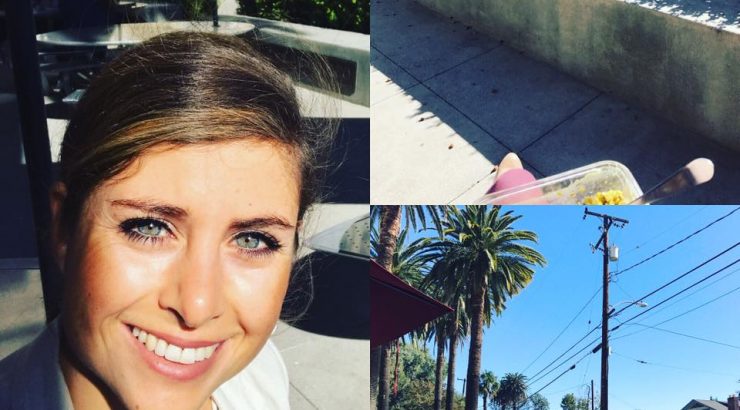
Mindfulness and Spirituality in using New Technologies Faculty Interview with Dr. Sophie Janicke-Bowles
January 20, 2017
Assistant Professor Dr. Sophie Janicke-Bowles, psychologist, researcher, educator, and innovator specializing in the field of Positive Psychology and Media, is one of the newest members of the School of Communication. After receiving her Ph.D. in Media Psychology from Florida State University in 2013, she worked as a member of the Communication Research Team at FSU and Penn State, which received a $1.95 million grant to analyze the daily use and effects of inspirational media.
Aside from working in academia for the last 5+ years, Dr. Janicke-Bowles has managed to live out her passion for yoga instructing and linking spirituality, mindfulness, and new media. She is the founder of the online community #RealBreak, a Facebook page that provides helpful tips and tricks for disconnecting from our electronics and busy work schedules, founder of the blog Rewire Happiness, which highlights ways to use modern technology to live happier and healthier lives, and co-founder of The Ecology of Technology movement, which promotes developing healthy relationships with advancing technology in order to live the most fulfilling lives possible.
As a professor, Dr. Janicke-Bowles is dedicated to giving her students the tools to implement mindfulness and media technologies into both their educational and personal lives. It is her goal to help students harness their strengths and truly thrive as productive, fulfilled members of society.
A passionate, committed, and curious individual, Dr. Janicke-Bowles is a welcome addition to the new School of Communication at Chapman University.
SOC: What drew you to the broad field of communication?
SJ: I am a psychologist by training but my family is all in the arts so I was always drawn to the way art, including media, impacts how we feel, think and behave as humans. I think it is fascinating to see how a simple (or complex) fictional (or real) tale can give us goosebumps, can make us reflect on the bigger picture of life and even change our behaviors.
SOC: Which aspects of communication do you find the most intriguing? Which aspects do you find the most challenging?
SJ: I am most fascinated by the field of media psychology, as mentioned because it deals with the everyday interactions we have in this society with the media we encounter. In this digital age, it is so important to understand what especially the new technologies are doing to us, and understand what we are doing with them. That is, how can we use our technologies in a way they serve our well-being, rather than hinder our growth. We have maybe 60, 70, 80 years to figure out why we are here and where we are going. Knowing that we spend most of our time during the day with our devices, we might as well find out how they can help us live meaningful and fulfilling lives. At the same time, this is a very challenging question to ask. The science of positive psychology is still in its infancy to figure out what leads to a fulfilling life and only a good handful of researchers explore the role that media plays for this goal, so we have long ways to go. We are dealing with humans here that are just very complex, and circumstances, personality traits, technology availability, and other variables always impact how media effects us. Also, a lot of times we deal with emotional states that people have a hard time to verbalize, which, however, is the main means of studying people. When we ask people what exactly they experience when they feel “inspired” they often just describe it as, well, “inspirational”. That does not help us much as researchers to get to the core of a specific emotional or cognitive media effect.
SOC: How have the various fields of communication changed since you were a student?
SJ: Well, when I started, the field of Positive Media Psychology didn’t really exist. The researcher Mary Beth Oliver, from Penn State University and Anne Bartsch from the University of Munich, Germany, as well as Peter Vorderer, former president of the International Communication Association, were among the first to explore media experiences that we would not describe as simply “enjoyable”. Movies like “Silence of the Lambs” or ‘Hotel Rwanda” are not merely sad dramas, but also not really entertaining. So they explored media experiences that make us feel happy and sad at the same time; also often referred to as elevation. From there on, more researchers joined to further define media that makes us find meaning and truth in life and just recently, including me and my team’s research at FSU and Penn State, we explored the question how media can elicit emotions that have been shown to contribute to well-being, including things like gratitude, elevation, awe, and compassion.
SOC: What led you to Chapman?
SJ: I always had Chapman on my radar applying for jobs. The scholarship at the School of Communication is top-notch with faculty coming in from top R1 schools in the country. With the “spiritual” mission and inclusivity the university puts forth I felt the school would be open to my research, that might be considered a little bit outside the box, and would provide me with the opportunities I sought out to spread the science of positive media psychology.
SOC: You recently became a certified yoga instructor. What inspired you to add yoga teaching to your professional practice?
SJ: Ha, that is a funny question. Well, spirituality is a big part of humans’ well-being. I started doing some research on spirituality in media during my dissertation time at FSU and with that combined my personal passion for spiritual growth with my profession. Becoming a yoga instructor was a natural next step on this path and I thought it would help me to better implement stress reduction and mindfulness practices into the classroom to help students navigate today’s information-overloaded digital life and give them tools to better concentrate on their college career inside and outside the classroom.

Dr. Janicke-Bowles being mindful
SOC: In addition to teaching and a yoga practice, you also run the Facebook group #RealBreak, which focuses on taking time out of our day to disconnect from our busy lives and give our minds a “real break.” What lead you to create this group? How has taking breaks in your day impacted your life? How can students use the skills #RealBreak teaches to reduce stress, especially during finals?
SJ: I started this group out of completely selfish reasons. When I started to focus more on my own mindfulness practice I noticed that since I can think I would always eat lunch in front of my computer and I knew how bad that is for us. I was in the mindset of just working, working, working but eventually, I would be burned out. Because it was so hard for me to get out of the practice of not eating lunch in front of my computer anymore, but actually leave the office, soak in the sun and fresh air, give my brain a break it deserves, recharge my cognitive batteries, even if it is just for 10 minutes, I needed something to hold myself accountable. So I started the group. And it worked. For over 2 years I have maybe eaten 5 times in front of my computer and I absolutely noticed the difference. It would give my mind a break, I noticed my shallow breathing and could do some exercises to deepen that breath and relax again, and I would get back to work much more refreshed and stronger. I would be more productive, and it increased my mood.
I would encourage students to become mindful of how they use their phones during meals in general. We tend to use meal times also as social media breaks, getting sucked into the wormhole of Instagram or FB only to notice (or rather not notice) that we did not even taste anything we just ate. Food is energy for our bodies. Besides water, without food, we would die. I feel like the minimum of respect that we can show toward food is to eat it mindfully, to actually taste our meal and be grateful that we do have a meal.
Besides, eating while doing something else makes us snack more later in the day and makes us more likely to overeat, research shows. So, many reasons to take a #RealBreak. I could fill a whole class with it.

Dr. Janicke’s Facebook group/movement encourages members to “work together and re-learn how to take a #Realbreak” during working hours.
SOC: As a professor, what is your greatest goal for all of your students? What advice do you have for recent or soon-to-be graduates?
SJ: Hmm, I would say the greatest goal for my students is to be able to find out how they can contribute positively to society. To find their deep purpose and what drives them in life, independent of if that fits society’s standards, makes a lot of money, or satisfies anybody’s expectations. At the end of our lives, we do not wish we would have worked more or made more money or had more “success”, but we wish we would have spent more time with our families, made a bigger contribution to society and taken more risks, not having fear stand in our ways and loved more. Having these thoughts guide us, I think, is a good template to build a life that is full of meaning, joy, and fulfillment.
SOC: What hopes do you have for the future of the new School of Communication?
SJ: Oh, I am so excited for our school. We already have such awesome faculty, that have an incredible impact on students and for the communication scholarship. I hope we will be able to expand and grow as we anticipated and become known as the best school of communication in the country. Not only in terms of research and student impact but also in terms of the integrity with which our faculty work with each other. I hope our motto: “Innovation, Imagination, and Inspiration through Interaction” will come to life even more than it already is.

